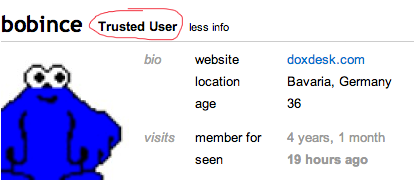Stack Overflow depends heavily on moderation by a body of reliable users dedicated to the site rather than merely gaining points and badges any way possible. It's vital to be able to tell these groups apart from each other.
Over time, reputation is going to become less and less reliable a way to do that. The voting system is easy to game, in many ways and shades. There are contributors rising "through the ranks" whose main motivation is not creating a high quality resource. They just post mediocre stuff in popular tags. Eventually, they will reach hundreds of thousands of rep.
The recent problems with the review queue show that there should be a better way of telling apart users genuinely concerned with quality from those just hanging out to earn rep and badges.
Now, machines and algorithms can always be gamed. The best detectors of dedicated users who are "for real" would arguably be - you and me! The dedicated, veteran users. In our everyday interactions on SO and maybe Meta, we come across fellow users and, over time, reach some judgement of them and their actions on the site. I could probably name fifty users right away who I would absolutely trust using the review queue. I could also find fifty users who I would absolutely not trust using the review queue.
Currently, there is no way for me to explicitly tell the system that I trust or distrust these users. Voting doesn't work for this: I may not be active in the same tags as them, or they may not be answering much on SO in the first place, but be busy editing and commenting. Or the bulk of their activity will be on Meta. Or I will know them personally from conferences and such, rather than the site itself. And one vote is only a drop in the bike-shed-ridden bucket anyway.
Should SO create a new, mostly invisible, social layer of trust? A way for a user to tell the system whether they trust a user or not. Obviously implemented in a way that doesn't break the basic SO idea of "it's about the content, not the users".
There are many ways to do this. Most are horribly flawed. There must absolutely not be any kind of public showing off of "trust rates" or something.
One way that might suck slightly less than all the others is a simple yes/no system.
A user would become a trusted user when they receive enough votes of confidence, let's call them "trust votes", from other trusted users. A number of trust votes is required to make you a trusted user, depending on how trusted the voters are. A moderator trust vote could make you trusted immediately. The algorithms used to calculate trustworthiness, and the threshold at which you yourself become trusted, would be secret. Votes of confidence would remain anonymous, so you never know how many people voted for you and who.
Once a user becomes a trusted user, the words "trusted user" would show up in their profile; no other public recognition is given.

The trusted user status gives them access to certain moderation tools that are closed to everyone else, even 20k+ users. (To me, the review queue should be one of them.) New moderation tools could become "trusted only" instead of 5k+, 10k+, 20k+ tools. (Migrating some existing privileges to "trusted only" would probably be too unfriendly an act to those who'd stand to lose it that way.)
Users would have a "I trust this person" / "I do not trust this person" button when they visit another user's profile. A trust vote is an important thing and people would have to be encouraged to use their votes wisely. Maybe through a total limit that you have to manage carefully, and that grows very slowly (say, five new votes a month).
As to how to get this whole thing started: at first, give, say, 50 trust votes to a limited circle. The ideal circle would be the people who have undergone the most scrutiny by the community, and are best equipped to have a good impression of users' activities: the moderators.
Let it spread from there, like a ponzi scheme, moderators trust-voting users, and those again trust-voting others - although maybe with less votes than the initial allotment that the moderators get. This would my favourite method of starting it because the feature would remain very low-key this way.
To reiterate, this is as non-social as can be. There is no public display of how many people trust you. You never know how many people trust or distrust you, and who they are. All that is visible to you and the public is the info whether you are a trusted user.
Making sure that only other trusted users can make you a trusted user help prevent "awesome, this user gave me the codez so I vote to trust him in return" situations. This suggestion is explicitly designed to battle bike shed voting by limiting the number of people who can vote.
Things that would have to be addressed:
Users from tags with little traffic might go unrecognized, as there are fewer people to observe and appreciate their activity.
There would have to be the possibility to withdraw "trusted user" status. Most likely if you gain a lot of negative trust votes. This would have to be dealt with carefully.

Trusted Userin your screenshot on the user profile page might be interpreted incorrectly by some. If someone notices that a user is trusted, they might assume that everything that they post in a particular tag is absolutely correct. We need a different word. I hope that I am not confusing.